Isa (A.S) died at age 120
Introduction
In the previous articles and sections, we have proved how the Quran, Ahadith, and the Ijmah of Sahaba رضي الله عنهم show us that Isa ﷺ has indeed died a natural death. Refer to this.
In this article, we will show the authentic reports of the Holy Prophet Muhammad ﷺ that even tell us the age of Isa ﷺ at the time of his death. These ahadith are mutawatir and prove Isa (A.S) was around 120 years old when he died.
Hadith #1
حَدَّثَنَا يَحْيَى بْنُ أَيُّوبَ الْعَلَّافُ الْمِصْرِيُّ، ثنا سَعِيدُ بْنُ أَبِي مَرْيَمَ، ثنا نَافِعُ بْنُ يَزِيدَ، حَدَّثَنِي عُمَارَةُ بْنُ غَزِيَّةَ، عَنْ مُحَمَّدِ بْنِ عَبْدِ اللهِ بْنِ عَمْرِو بْنِ عُثْمَانَ، أَنَّ أُمَّهُ، فَاطِمَةُ بِنْتُ حُسَيْنٍ حَدَّثَتْهُ، أَنَّ عَائِشَةَ كَانَتْ تَقُولُ: إِنَّ رَسُولَ اللهِ صَلَّى اللهُ عَلَيْهِ وَسَلَّمَ فِي مَرَضِهِ الَّذِي قُبِضَ فِيهِ، قَالَ لِفَاطِمَةَ: «يَا بُنَيَّةُ احْنِي عَلَيَّ» فَأَحْنَتْ عَلَيْهِ فَنَاجَاهَا سَاعَةً ثُمَّ انْكَشَفَتْ وَهِيَ تَبْكِي وَعَائِشَةُ حَاضِرَةٌ ثُمَّ قَالَ رَسُولُ اللهِ صَلَّى اللهُ عَلَيْهِ وَسَلَّمَ بَعْدَ ذَلِكَ بِسَاعَةٍ: «احْنِي عَلَيَّ يَا بُنَيَّةُ» فَأَحْنَتْ عَلَيْهِ فَنَاجَاهَا سَاعَةً ثُمَّ انْكَشَفَتْ عَنْهُ فَضَحِكَتْ قَالَتْ عَائِشَةُ: فَقُلْتُ: أَيْ بُنَيَّةُ، أَخْبِرِينِي مَاذَا نَاجَاكِ أَبُوكِ؟ فَقَالَتْ فَاطِمَةُ: نَاجَانِي عَلَى حَالٍ سِرٍّ، ظَنَنْتِ أَنِّي أُخْبِرُ بِسِرِّهِ وَهُوَ حَيٌّ فَشَقَّ ذَلِكَ عَلَى عَائِشَةَ أَنْ يَكُونَ سِرًّا دُونَهَا، فَلَمَّا قَبَضَهُ اللهُ، قَالَتْ عَائِشَةُ لِفَاطِمَةَ: يَا بُنَيَّةُ، أَلَا تُخْبِرينِي بِذَلِكَ الْخَبَرِ؟ قَالَتْ: أَمَّا الْآنَ، فَنَعَمْ، نَاجَانِي فِي الْمَرَّةِ الْأُولَى فَأَخْبَرَنِي أَنَّ جِبْرِيلَ صَلَّى اللهُ عَلَيْهِ وَسَلَّمَ كَانَ يُعَارِضُهُ بِالْقُرْآنِ فِي كُلِّ عَامٍ مَرَّةً، وَأَنَّهُ عَارَضَهُ بِالْقُرْآنِ الْعَامَ مَرَّتَيْنِ، وَأَخْبَرَنِي أَنَّهُ أَخْبَرَهُ أَنَّهُ لَمْ يَكُنْ نَبِيٌّ إِلَّا عَاشَ نِصْفَ عُمَرَ الَّذِي قَبْلَهُ، وَأَنَّهُ أَخْبَرَنِي أَنَّ عِيسَى ابْنَ مَرْيَمَ عَاشَ عِشْرِينَ وَماِئةَ سَنَةٍ وَلَا أُرَانِي إِلَّا ذَاهِبًا عَلَى رَأْسِ السِّتِّينَ فَأَبْكَانِي ذَلِكَ وَقَالَ: «يَا بُنَيَّةُ، إِنَّهُ لَيْسَ مِنْ نِسَاءِ الْمُسْلِمِينَ امْرَأَةٌ أَعْظَمُ رُزِّيَّةً مِنْكِ، فَلَا تَكُونِي أَدْنَى مِنِ امْرَأَةٍ صَبْرًا» وَنَاجَانِي فِي الْمَرَّةِ الْآخِرَةِ فَأَخْبَرَنِي أَنِّي أَوَّلُ أَهْلِهِ لُحُوقًا بِهِ وَقَالَ: «إِنَّكِ سَيِّدَةُ نِسَاءِ أَهْلِ الْجَنَّةِ إِلَّا مَا كَانَ مِنَ الْبَتُولِ مَرْيَمَ بِنْتِ عِمْرَانَ» فَضَحِكَتُ بِذَلِكَ
“The Holy Prophet (sa) said, ‘Gabriel informed me that every successive prophet has lived to half the age of his predecessor. And verily he informed me Jesus, son of Mary, lived to 120 years. Therefore, I perceive that I may reach the age of 60.”
[Al Mu’jam Al Kabir Tabarani, 1031, 22/417]
This hadith is narrated by multiple Sahabas رضي الله عنهم including Ayesha (R.A), Fatima (R.A), Ibn Umar (R.A) and Zaid bin Arqam (R.A). It is also authenticated by the likes of Ibn Hajar, Imam Bayhuti, and Imam Qastallani. It clearly proves that Isa (A.S) age at the time of his death was 120, and says that Gabriel informed the Messenger of Allah (saw) of this directly through revelation.
Authenticity of Hadith #1
Ibn Hajar Al-Asqalani
He grades the Zaid bin Arqam (R.A) chain as Hasan. In the next line, regarding the Ayesha (R.A) chain, he says,
“أخرج الطبراني في الكبير بسند رجاله ثقات”
“Al-Tabarani narrated in Al-Kabeer with a chain of narrators whose narrators are trustworthy.”
[Ajwibatu Ibn Hajar al-‘Asqalani, pg 79]
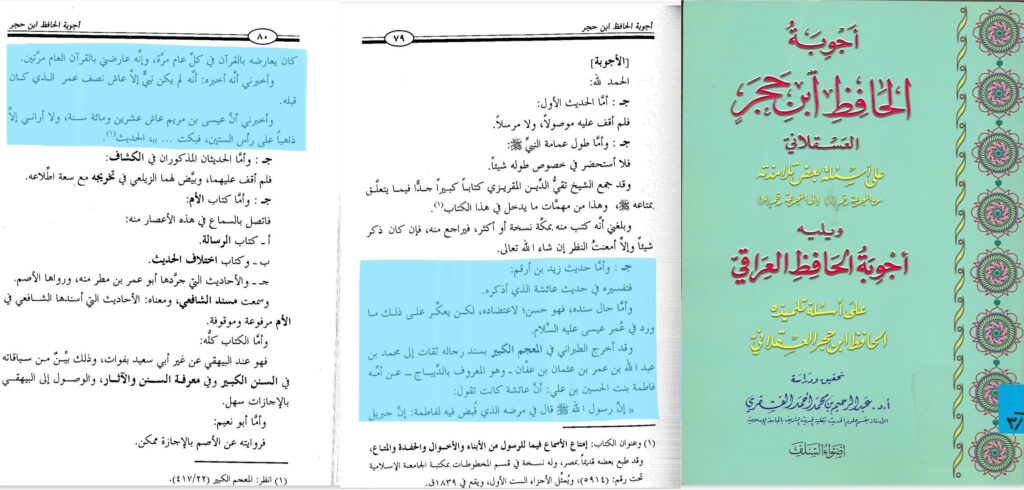
Al-Qastallani
Regarding the Ayesha (R.A) chain, he says,
“أخرج الطبراني في الكبير بسند رجاله ثقات”
“Al-Tabarani narrated in Al-Kabeer with a chain of narrators whose narrators are trustworthy.”
[Sharh Allama Zurqani, pg 67]
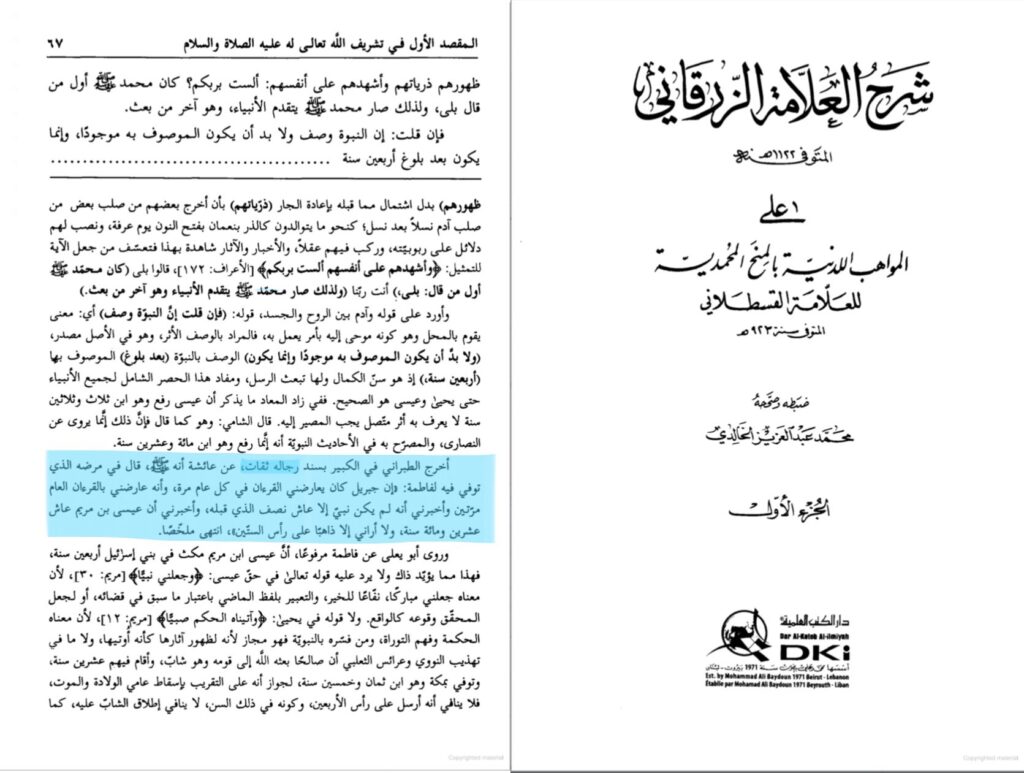
Imam Al-Sakhawi
He grades the Zaid bin Arqam (R.A) chain as Hassan. In the next line, regarding the Ayesha (R.A) chain, he says,
“أخرج الطبراني في الكبير بسند رجاله ثقات”
“Al-Tabarani narrated in Al-Kabeer with a chain of narrators whose narrators are trustworthy.“
[Al-Maqasid Al-Hasanah, pg 575]
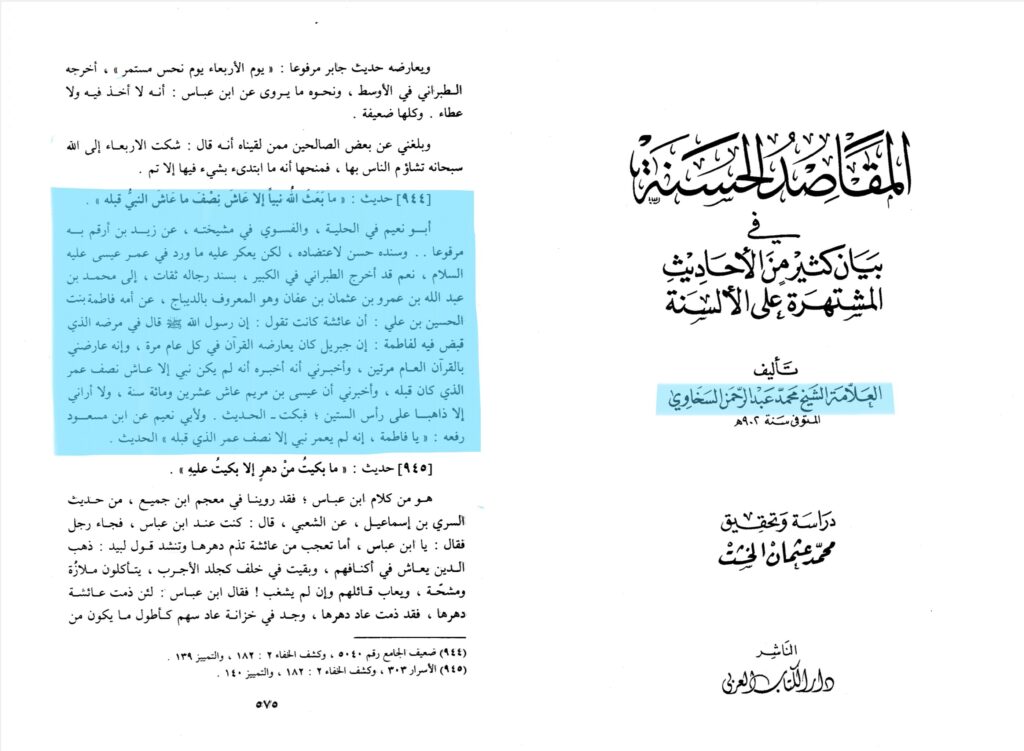
Ismail Bin Muhammad Al-Ajlouni
He grades the Zaid bin Arqam (R.A) chain as Hassan. In the next line, regarding the Ayesha (R.A) chain, he says,
“أخرج الطبراني في الكبير بسند رجاله ثقات”
“Al-Tabarani narrated in Al-Kabeer with a chain of narrators whose narrators are trustworthy.”
[Kashf Al-Khafa Wa-Muzil Al-Ilbas, pg X]

Nawab Siddiq Hassan Khan
ره ورعطریضتی بالقران العام مزین اخبری از امین نبی الاعاش عضت الذمی قبل ما نبری ان سے بنایم ماست عنی باید سنا لان الاناسیاست اسرایتین رجاله بالثقات و له طریق تمام بت در بدت دی
“Narrators are trustworthy (thiqa)….”
[Atharul Qiyamah fi Hajajul Qramah, pg 428]
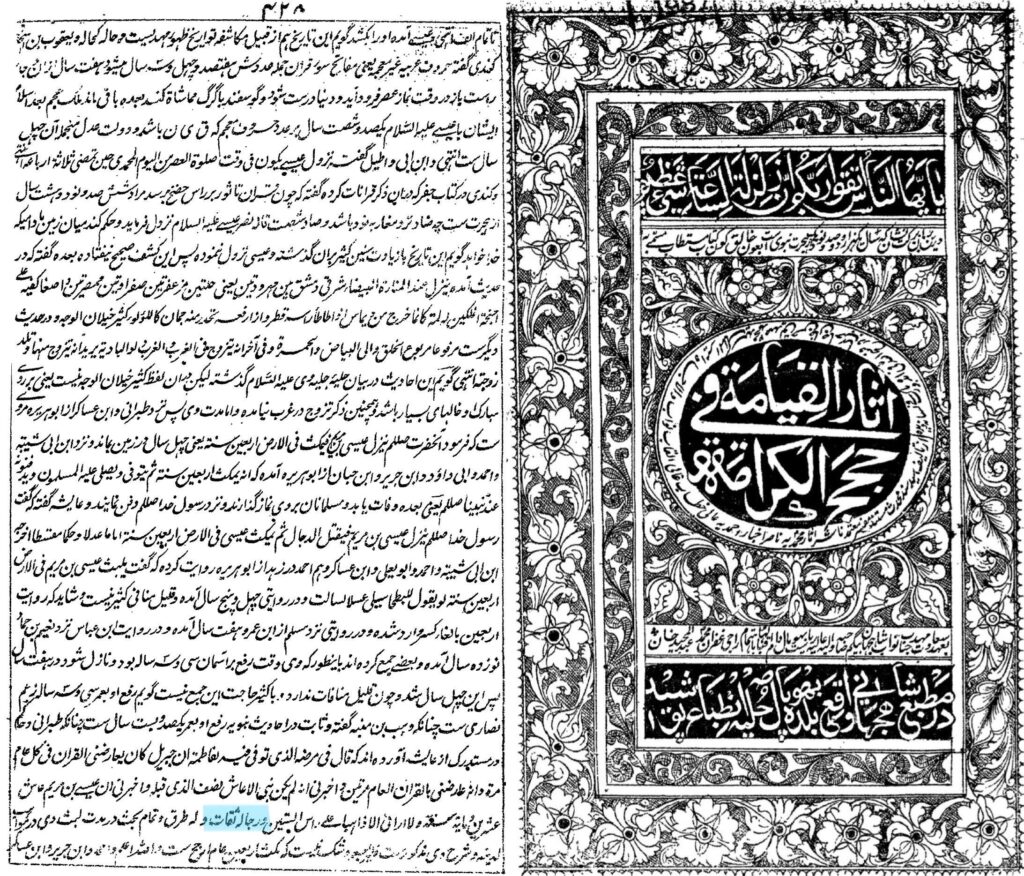
Imam Muhammad ibn Yusuf al-Saalihi al-Shami
Regarding the Fatimah (R.A) chain, he says,
“وروي الطبراني والحاكم والطحاوي والبيهفي سند صحيح”
“Narrated by Tabarani, Al-Hakim, Tahawi and Bayhuti that the chain of narrators is Sahih”
[Subalul Huda wa Irshaad fi sirat Khairul Ibaad, pg 230]

Imam Al-Bayhaqi
Imām al-Bayhaqī (R.H) considers it Sahih.
This is because he does not reject this narration in his book Dala’il al-Nubuwwah, pg 166. Rather, he does taweel (interprets) it in light of the narration by Ibn Al-Musab and Wahb Ibn Munabbih where they say Isa (A.S) died at the age of 32 or 33, respectively. He says after his descent, Isa (A.S) will complete the remaining years of his life and die at the age of 120.
Although we don’t agree with the taweel of Imam Al-Bayhaqi, we only quote it to prove that the narration is not Daif (weak) or Ghareeb (strange). As if it was weak, he would have not done taweel (interpretation) but would have rejected it completely!
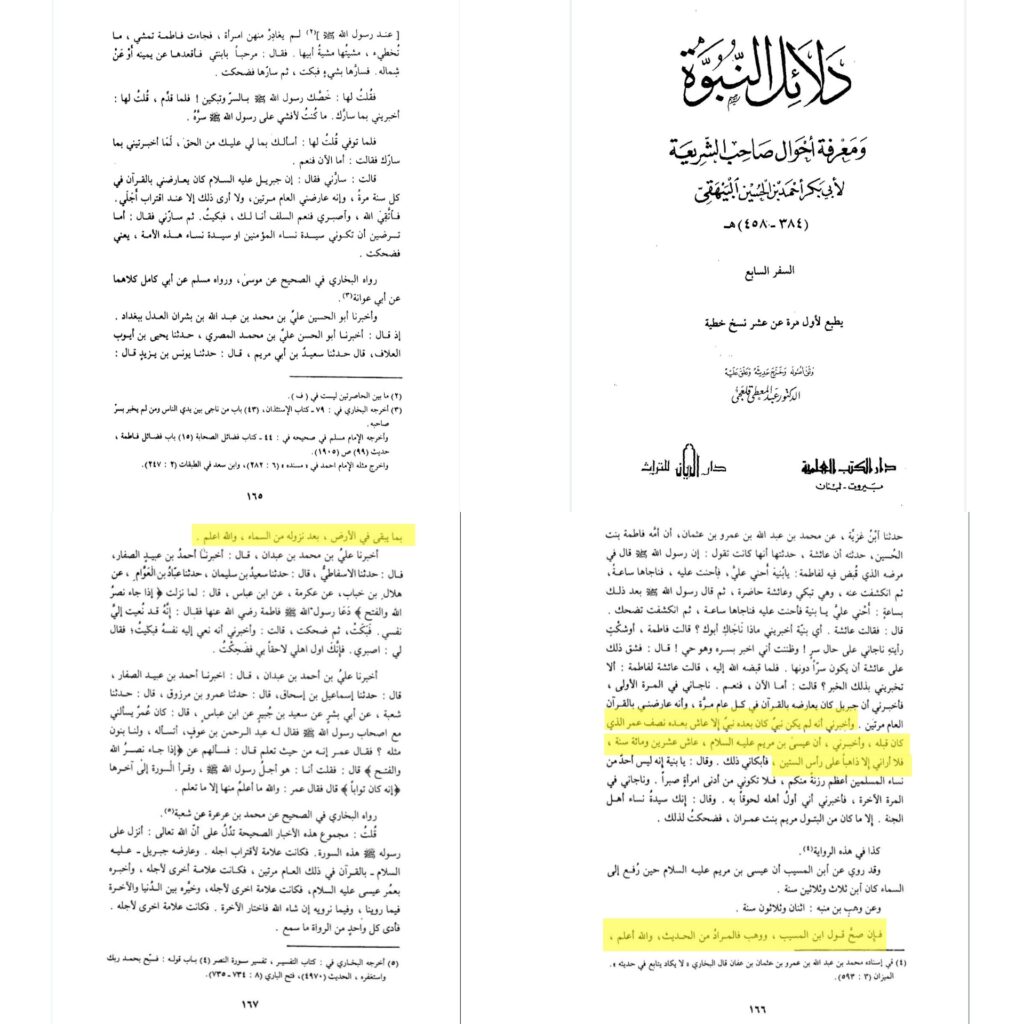
Hadith #2
Along with the previous hadith that clearly establishes the age of Isa (A.S) to be 120 at the time of death, we have another similar hadith but without the age mentioned. This is narrated from a different chain than the above.
حدثنا علي بن عبد العزيز ، ثنا أبو نعيم ، ثنا كامل أبو العلاء ، قال : سمعت حبيب بن أبي ثابت ، يحدث عن يحيى بن جعدة ، عن زيد بن أرقم ، قال : خرجنا مع رسول الله – صلى الله عليه وسلم – حتى انتهينا إلى غدير خم أمر بدوح فكسح في يوم ما أتى علينا يوم كان أشد حرا منه ، فحمد الله وأثنى عليه [ ص: 172 ] وقال : “ يا أيها الناس إنه لم يبعث نبي قط إلا عاش نصف ما عاش الذي كان قبله ، وإني أوشك أن أدعى فأجيب ، وإني تارك فيكم ما لن تضلوا بعده كتاب الله ” ثم قام وأخذ بيد علي – رضي الله عنه – فقال : ” يا أيها الناس من أولى بكم من أنفسكم ؟ ” قالوا : الله ورسوله أعلم ، قال من كنت مولاه فعلي مولاه
“Verily, a Prophet was never sent except that he lived for half the lifespan of the Prophet who preceded him.”
[Al Mu’jam Al Kabir Tabarani, 172, 4986]
Explanation 1
It shows that every prophet lives ATLEAST half of the age of the previous prophet. If Isa (A.S) is alive as of now, his age would be 2000 years. For Muhammad (S.A.W) to be a prophet of Allah, he has to live at least half of that i.e 1000 years. Since he died at age 63/64, he is not a prophet of Allah as per the non-Ahmadi Muslims who believe Isa (A.S) is still alive, Nauthibillah.
Common Misconception
Some people believe that every prophet HAS TO live exactly half the age of the previous prophet. For example:
- If Muhammad (S.A.W) – 60 years
- Then Isa (A.S) – 120 years
- And Yahya (A.S) – 240 years
And so on…
However, this is not a correct understanding of the hadith. The hadith only proves that Allah guarantees that the prophet lives at least half the age of the previous prophet. For example: If the Prophet before Isa (as) lived to let’s say 100 years, then him living to 120 still goes past 50.
Explanation 2
Another explanation is that this rule of half age of the prophet is not a general rule but it only applies to Muhammad (S.A.W) and Isa (A.S) because such examples can be from ahadith.
This was said in regard to Prophet’s inheritance. Muhammad (S.A.W) says,
“Allah’s Messenger (ﷺ) said. ‘We (Apostles) do not bequeath anything to our heirs, but whatever we leave is to be given in charity.’ And by that Allah’s Messenger (ﷺ) meant himself.’ The group said, ‘(No doubt), he said so.‘ `Umar then faced `Ali and `Abbas and said, ‘Do you both know that Allah’s Messenger (ﷺ) said that?’ They replied, ‘(No doubt), he said so.’”
[Sahih al-Bukhari 5358]
As seen from the above example, Sahabas quote a general principle stated by Muhammad (S.A.W), however, they know it only applied to himself because we have 2 prophets mentioned in Quran who had heirs.
1) Dawud (A.S)
“And Solomon was heir to David.”
2) Zakarya (A.S)
“This is an account of the mercy of thy Lord shown to His servant, Zachariah. When he called upon his Lord, crying in secret. He said, ‘My Lord, the bones have indeed waxed feeble in me, and the head glistens with hoariness but never, my Lord, have I been unblessed in my prayer to Thee; And I fear my relations after me, and my wife is barren. Grant me, therefore, a successor from Thyself, That he may be heir to me and heir to the House of Jacob. And make him, my Lord well-pleasing to Thee.’”
So now we know that prophets can leave the heirs and the statement of Muhammad (S.A.W) is not a general rule but it only applies to himself as agreed by the Sahabas (R.A) in the Bukhari narration.
In fact, Hazrat Hakeem-ul-Ummat Maulana Hafiz Noor-ad-Deen (RA) endorsed explanation two which has been given above.
The Following Prophet’s age being half that of the previous Prophet
نبی کی عمر پہلے نبی سے نصف
سوال ۔!السلام علیکم ورحمۃ اللہ
حضرت مسیح موعود نے ایک جگہ وہ حدیث لکھی ہے جس میں ہے کہ نبی کی عمر پہلے سے نصف ہوتی ہے ۔ غالبا وہ یوں ہے انـه لـم يـكـن نبـي إلا عـاش نصف عمر الذي كان قبله و انـه أخبرني أن عيسى بن مريم عليهما السّلام عاش عشرين ومائة سنة ولا أراني إلا ذاهبا لى رأس ستين (الاحاد و المثاني النساء فاطمة ابنة رسول اللہ ) ۔ اس پر بعض لوگ کہتے ہیں کہ یہ حدیث عقل کے خلاف ہے ۔حضورفر ماو میں کیا جواب دیا جاوے۔ اکمل علی اللہ عنہ
جواب۔ صحیح حدیث پر اٹکل بازی کرنا چکڑالویوں ، نیچریوں کا طرز ہے ۔ صحت پر محدثانہ بحث ہونی چاہئے ۔ انبیاء کے اقسام ہیں ۔ حدیث میں یہ مذکور نہیں کہ کس کس قسم کے انبیاء میں یہ نسبت ہوتی ہے۔تلك الرسل فضلنا بعضهم على بعض (البقرۃ:۱۵۴) سے امتیاز ظاہر ہوتا ہے ۔ ہر حدیث کی تکذیب کرنا چکڑالویوں کا کام ہے ۔مومن کا بی طریق نہیں ۔ والسلام
کیا کسی نے اس کو وضعی کہا ہے اور کہنے والا ائمہ حدیث سے ہے۔
والسلام
نورالدین
Question – Syedna! Assalamu Alaykum Wa Rahmatullah
The Promised Messiah has written a hadith in one place, in which it is said that the Prophet’s age is half of the previous one. Mostly أَنَّهُ لَمْ يَكُنْ نَبِيٌّ إِلَّا عَاشَ نِصْفَ عُمَرَ الَّذِي قَبْلَهُ، وَأَنَّهُ أَخْبَرَنِي أَنَّ عِيسَى ابْنَ مَرْيَمَ عَاشَ عِشْرِينَ وَماِئةَ سَنَةٍ وَلَا أُرَانِي إِلَّا ذَاهِبًا عَلَى رَأْسِ السِّتِّينَ
[‘Gabriel informed me that every successive prophet has lived to half the age of his predecessor. And verily Jesus, son of Mary, lived to 120 years. Therefore, I perceive that I may reach the age of 60.]
Some people say that this hadith is against common sense.
Reply – Speculating or applying Qiyas on a Sahih hadith is the style of the Chakralvis [Quranists] and the naturalists. There should be a discussion on health of the hadith based on the principles of the Muhaditheen[Hadith Scholars]. There are Categories of prophets. It is not mentioned in the hadith which type of prophets this is referring to. The verse ۔تلك الرسل فضلنا بعضهم على بعض (البقرۃ:۱۵۴) [These Messengers have We exalted, some of them above others Al Baqarah 2:254] makes apparent this difference.Refuting/Accusing/Falsifying every hadith is the work of the Chakralvis [Quranists]. It is not the way of the believer. Peace be upon you
Has anyone said it is fabricated and the ones saying it are Imams of Hadith?
Peace be upon you
Nuruddin
[Badr – November 7, 1912]
Authenticity of Hadith #2
- Sheikh Albani grades it Sahih. (Link)
- Imam Hakim grades it Sahih. (Link)
- Hadith-Maktaba grades all narrators Thiqa (trustworthy). (Link)
Hadith #3
There is another hadith that contains the same words and is again mentioned by Imam Al-Tabarani in his book Al Mu’jam Al Kabir. This is a different chain with Hudhaifa bin Usaid Al Ghifari. The chain is as follows:
Muḥammad b. ‘Abd Allāh al-Ḥadramī and Zakariyyāh b. Yaḥ yā al-Sājī – Naṣr b. ‘Abd al-Raḥmanal-Washā – A ḥmad b. al-Qāsim b. Musāwar al-Jawharī and Sa’īd b. Sulaymān al-Wāsiṭ ī – Zayd b.al-Ḥasan al-Anmāṭ ī – Ma’rūf b. Kharbūz – Abū al-Ṭufayl –Ḥudhayfah b. Usayd al-Ghiffārī
حدثنا محمد بن عبد الله الحضرمي وزكريا بن يحيى الساجي ، قالا : ثنا نصر بن عبد الرحمن الوشاء ، ح . وحدثنا أحمد بن القاسم بن مساور الجوهري ، ثنا سعيد بن سليمان الواسطي ، قالا : ثنا زيد بن الحسن الأنماطي ، ثنا معروف بن خربوذ ، عن أبي الطفيل ، عن حذيفة بن أسيد الغفاري ، قال : لما صدر رسول الله صلى الله عليه وسلم من حجة الوداع نهى أصحابه عن شجرات بالبطحاء متقاربات أن ينزلوا تحتهن ، ثم بعث إليهن فقم ما تحتهن من الشوك ، وعمد إليهن فصلى تحتهن ، ثم قام فقال : ” يا أيها الناس ، إني قد نبأني اللطيف الخبير أنه لم يعمر نبي إلا نصف عمر الذي يليه من قبله ، وإني لأظن أني يوشك أن أدعى فأجيب ، وإني مسئول ، وإنكم مسئولون ، فماذا أنتم قائلون ؟ ” قالوا : نشهد أنك قد بلغت وجاهدت ونصحت ، فجزاك الله خيرا .
فقال : ” أليس تشهدون أن لا إله إلا الله وأن محمدا عبده ورسوله ، وأن جنته حق وناره حق ، وأن الموت حق ، وأن البعث بعد الموت حق ، وأن الساعة آتية لا ريب فيها ، وأن الله يبعث من في القبور ؟ ” قالوا : بلى ، نشهد بذلك . قال : ” اللهم اشهد ” .
ثم قال : ” أيها الناس ، إن الله مولاي ، وأنا مولى المؤمنين ، وأنا أولى بهم من أنفسهم ، فمن كنت مولاه فهذا مولاه – يعني عليا – اللهم وال من والاه ، وعاد من عاداه ” .
ثم قال : ” يا أيها الناس ، إني فرطكم ، وإنكم واردون علي الحوض ، حوض أعرض ما بين بصرى وصنعاء ، فيه عدد النجوم قدحان من فضة ، وإني سائلكم حين تردون علي عن الثقلين ، فانظروا كيف تخلفوني فيهما ، الثقل الأكبر كتاب الله عز وجل ، سبب طرفه بيد الله ، وطرفه بأيديكم ، فاستمسكوا به لا تضلوا ولا تبدلوا ، وعترتي أهل بيتي ، فإنه نبأني اللطيف الخبير أنهما لن ينقضيا حتى يردا علي الحوض
“When the Messenger of Allāh, peace be upon him, returned from the Farewell Ḥajj, he stoppedHis Ṣaḥābah are a group of trees and asked them to camp under them. Then he sent a messenger to them (i.e. the trees) to pick the thorns under them. Then he went to them, and prayed under them. Then he stood up and said, “O mankind! The Compassionate All-Knowing (Allāh) has informed me that a prophet never lives beyond half the age of the one before him. I think I will be called (soon) and I will answer. I will be questioned (by Allāh) and you too will be questioned. So, what will you say (in reply when you are questioned)?” They said, “We testify that you conveyed (the Message of Allāh to us), and you made jihād and guided us. May Allāh reward you with good.”
[Al Mu’jam Al Kabir Tabarani, vol. 3, p.180, #3052]
Authenticity of Hadith #3
This hadith is either Sahih on the standard of Ibn Hibban and Darussalam or at least Hassan by the standards of Imam Tirmidhi.
Albani has criticized this narration due to only one narrator Al-Anmati quoting Abu Hatim’s words. Before we refute him, here is what others have to say about Al-Anmati.
Tirmidhi
He quotes a chain with Zaid bin Al Hasan Al-Anmati in the hadith and grades it Hasan Ghareeb which is basically Hasan grading.
(Sunan al-Tirmidhī, vol. 5, p. 662, # 3786)
Darussalam
Darussalam grades the same Tirmidhi narration with the same Al-Anmati as Sahih.
Ibn Hibban
He calls Zaid bin Al Hasan Al-Anmati Thiqa (trustworthy). Check the Albani quote below.
Refuting Albani’s criticism of Zaid bin Al Hasan Al-Anmati
Now that we have shown 3 sources calling Al-Anmati trustworthy, let’s see if the criticism of Albani holds any weight. This is what he says:
“This chain is ḍa’īf, due to this al-Anmati. Abū Ḥātim said: “ Munkar al-ḥadīth”. As for Ibn Ḥibbān, he has mentioned him in al-Thiqāt (The Trustworthy Narrators)! But, al-Ḥāfiz gave no weight to it. So, he said in al-Taqrīb: “Ḍa’īf ”.
The ḥadīth has been recorded fully by al-Haythamī (9/164-165) from the report of al-Ṭabarānī in the hadīth of Ḥudhayfah b. Usayd, and he faulted it through this al-Anmāṭ ī, except that he (also) quoted the statement of Abū Ḥātim and Ibn Ḥibbān about him.”
[Silsilah al-Aḥādīth al-Ḍa’īfah wa al- Mawḍ ū’ah wa Atharihah al-Sayyiah fī al-Ummah, vol. 10, p. 679-680, # 4961]
But this criticism by Albani is invalid since he ignores the opinion of Ibn Hibban who calls the same narrator Thiqa. Rather he picks Abu Hatim’s opinion only when we know from Ibn Hajar that when it comes to Abu Hatim’s opinion on any narrator, always pick the opinion of someone else that calls the narrator reliable. This is because Abu Hatim is extremely picky about each narrator. He says it here:
“In al-Mīzān, it is stated that Abū Ḥātim said “He is not accepted as a ḥujjah”. But, watch that carefully. There is stubbornness in Abū Ḥātim. He (the narrator) has been accepted as a ḥujjah by the majority.”
[Hadī al-Sārī Muqaddimah Fatḥ al-Bārī, p. 441]
Imām al-Dhahabī provides says the same about Abu Hatim:
“If Abū Ḥātim declares a narrator to be thiqah(trustworthy), then hold fast to his statement, because he never declares a narrator to be thiqah except a narrator whose a ḥādīth are ṣaḥīḥ. If he weakens a narrator, or says about him “he is not accepted as a ḥujjah”, then pause until you have seen what others have said about him (i.e. that narrator). If there is A SINGLE other person who declares him (i.e. the narrator) to be thiqah (trustworthy), then do not adopt the criticism of Abū Ḥātim, because he is stubborn in rijāl.”
[Siyar A’lām al- Nubalā, vol. 13, p. 260, # 129]
So as seen above, even this narration of Ḥudhayfah b. Usayd al-Ghiffārī is Sahih or at least Hasan and no one can deny our Prophet Muhammad (S.A.W) has said these words.
Conclusion
In this article, we showed that the narrations regarding the death of Isa (A.S) at the age of 120 are
- Sahih and we see them in multiple different chains with different narrators. Thus they are mutawatir.
- They are authenticated by numerous scholars.
- Even if someone ever proves 1 chain as Daif (weak), other chains still stand.
We also proved that the saying “Every prophet lives half the age of the prophet” can mean 2 things.
- Every prophet reaches half the age of the previous prophet. This is one of the signs of the truthfulness of a prophet. They can go beyond the half-age mark, but reaching half is a guarantee by Allah.
- The statement only applies to Muhammad (S.A.W) and Isa (A.S). It does not apply to all prophets as Muhammad (S.A.W) has said similar things in the example hadith we provided above where the general rule is said but only applies to him.
